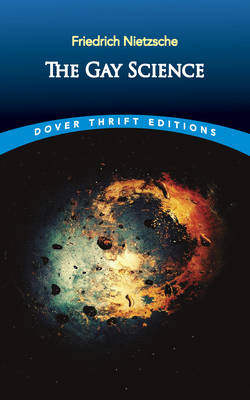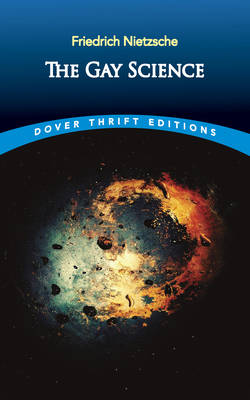
Bedankt voor het vertrouwen het afgelopen jaar! Om jou te bedanken bieden we GRATIS verzending (in België) aan op alles gedurende de hele maand januari.
- Afhalen na 1 uur in een winkel met voorraad
- In januari gratis thuislevering in België
- Ruim aanbod met 7 miljoen producten
Bedankt voor het vertrouwen het afgelopen jaar! Om jou te bedanken bieden we GRATIS verzending (in België) aan op alles gedurende de hele maand januari.
- Afhalen na 1 uur in een winkel met voorraad
- In januari gratis thuislevering in België
- Ruim aanbod met 7 miljoen producten
Zoeken
€ 11,95
+ 23 punten
Uitvoering
Omschrijving
Although dour in appearance and formidable in reputation, Friedrich Nietzsche was an ardent practitioner of the art of poetry--known in twelfth-century Provençal as "the gay science." This extensive collection of prose and verse offers a sophisticated treatment of the philosophical themes and views central to his thinking, as well as the ideas that proved most influential to later philosophers.
Dating from the era when Nietzsche was at the peak of his intellectual powers, most of this book was written just before Thus Spoke Zarathustra, and the rest of it five years later, after Beyond Good and Evil. Zarathustra makes his first appearance in these pages, along with the author's well-known proclamation of the death of God. Readers will find this volume a wellspring for some of Nietzsche's most sustained and thought-provoking discussions of art and morality, knowledge and truth, the intellectual conscience, and the origin of logic, as well as the largest collection of Nietzsche's published poetry.
Dating from the era when Nietzsche was at the peak of his intellectual powers, most of this book was written just before Thus Spoke Zarathustra, and the rest of it five years later, after Beyond Good and Evil. Zarathustra makes his first appearance in these pages, along with the author's well-known proclamation of the death of God. Readers will find this volume a wellspring for some of Nietzsche's most sustained and thought-provoking discussions of art and morality, knowledge and truth, the intellectual conscience, and the origin of logic, as well as the largest collection of Nietzsche's published poetry.
Specificaties
Betrokkenen
- Auteur(s):
- Uitgeverij:
Inhoud
- Aantal bladzijden:
- 256
- Taal:
- Engels
- Reeks:
Eigenschappen
- Productcode (EAN):
- 9780486841687
- Verschijningsdatum:
- 21/05/2020
- Uitvoering:
- Paperback
- Formaat:
- Trade paperback (VS)
- Afmetingen:
- 137 mm x 211 mm
- Gewicht:
- 226 g

Alleen bij Standaard Boekhandel
+ 23 punten op je klantenkaart van Standaard Boekhandel
Beoordelingen
We publiceren alleen reviews die voldoen aan de voorwaarden voor reviews. Bekijk onze voorwaarden voor reviews.









